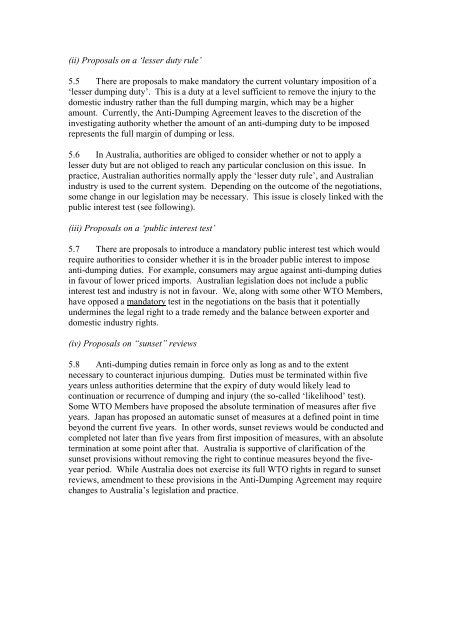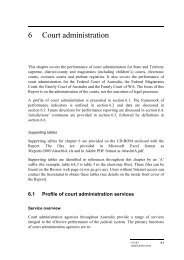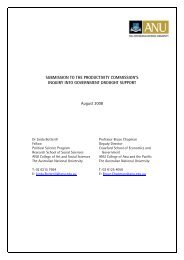Department of Foreign and Trade (PDF - 43 Kb) - Productivity ...
Department of Foreign and Trade (PDF - 43 Kb) - Productivity ...
Department of Foreign and Trade (PDF - 43 Kb) - Productivity ...
You also want an ePaper? Increase the reach of your titles
YUMPU automatically turns print PDFs into web optimized ePapers that Google loves.
(ii) Proposals on a ‘lesser duty rule’<br />
5.5 There are proposals to make m<strong>and</strong>atory the current voluntary imposition <strong>of</strong> a<br />
‘lesser dumping duty’. This is a duty at a level sufficient to remove the injury to the<br />
domestic industry rather than the full dumping margin, which may be a higher<br />
amount. Currently, the Anti-Dumping Agreement leaves to the discretion <strong>of</strong> the<br />
investigating authority whether the amount <strong>of</strong> an anti-dumping duty to be imposed<br />
represents the full margin <strong>of</strong> dumping or less.<br />
5.6 In Australia, authorities are obliged to consider whether or not to apply a<br />
lesser duty but are not obliged to reach any particular conclusion on this issue. In<br />
practice, Australian authorities normally apply the ‘lesser duty rule’, <strong>and</strong> Australian<br />
industry is used to the current system. Depending on the outcome <strong>of</strong> the negotiations,<br />
some change in our legislation may be necessary. This issue is closely linked with the<br />
public interest test (see following).<br />
(iii) Proposals on a ‘public interest test’<br />
5.7 There are proposals to introduce a m<strong>and</strong>atory public interest test which would<br />
require authorities to consider whether it is in the broader public interest to impose<br />
anti-dumping duties. For example, consumers may argue against anti-dumping duties<br />
in favour <strong>of</strong> lower priced imports. Australian legislation does not include a public<br />
interest test <strong>and</strong> industry is not in favour. We, along with some other WTO Members,<br />
have opposed a m<strong>and</strong>atory test in the negotiations on the basis that it potentially<br />
undermines the legal right to a trade remedy <strong>and</strong> the balance between exporter <strong>and</strong><br />
domestic industry rights.<br />
(iv) Proposals on “sunset” reviews<br />
5.8 Anti-dumping duties remain in force only as long as <strong>and</strong> to the extent<br />
necessary to counteract injurious dumping. Duties must be terminated within five<br />
years unless authorities determine that the expiry <strong>of</strong> duty would likely lead to<br />
continuation or recurrence <strong>of</strong> dumping <strong>and</strong> injury (the so-called ‘likelihood’ test).<br />
Some WTO Members have proposed the absolute termination <strong>of</strong> measures after five<br />
years. Japan has proposed an automatic sunset <strong>of</strong> measures at a defined point in time<br />
beyond the current five years. In other words, sunset reviews would be conducted <strong>and</strong><br />
completed not later than five years from first imposition <strong>of</strong> measures, with an absolute<br />
termination at some point after that. Australia is supportive <strong>of</strong> clarification <strong>of</strong> the<br />
sunset provisions without removing the right to continue measures beyond the fiveyear<br />
period. While Australia does not exercise its full WTO rights in regard to sunset<br />
reviews, amendment to these provisions in the Anti-Dumping Agreement may require<br />
changes to Australia’s legislation <strong>and</strong> practice.

















